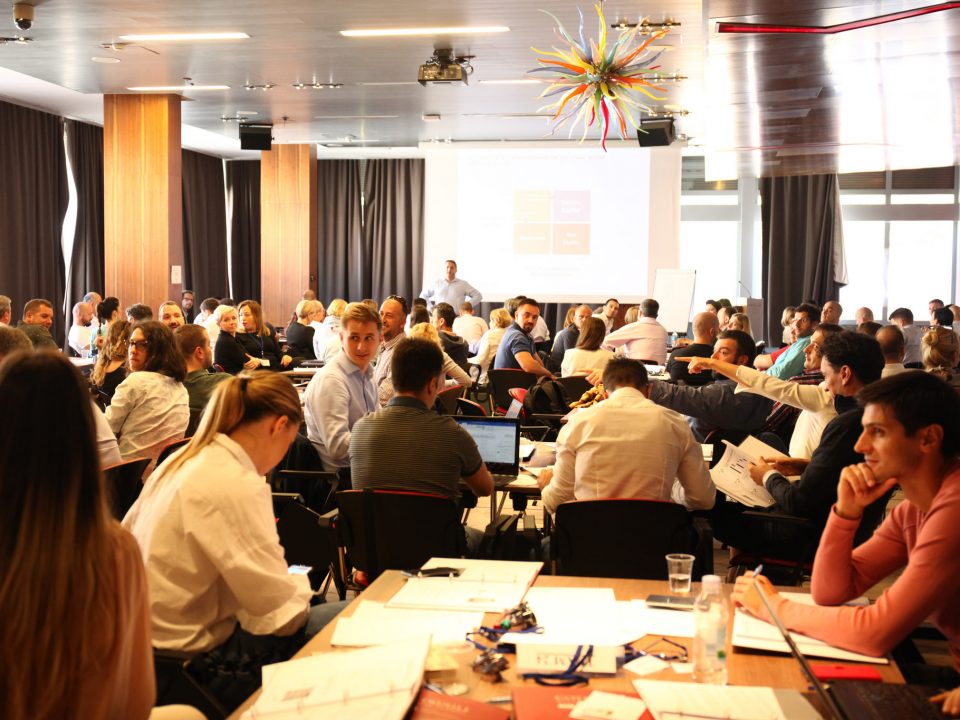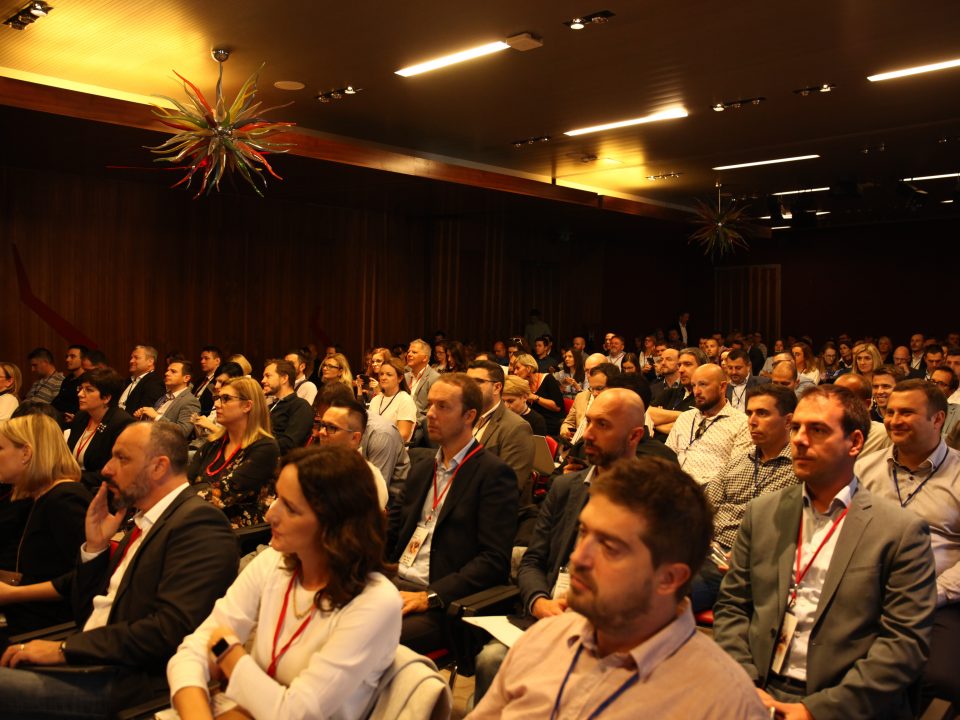A new technology could cause disruptive changes

The official agenda of Business 4.x & Future of HR conference 2018
27th September 2018
Digital technology for the UN Sustainable Development Goals – Framework and Examples
1st October 2018There are more than 20 speakers at Business 4.x & Future of HR conference and Branko Mitrović, a CEO at fSD is one of them. Read the story about how he is already implementing new technologies in everyday business:
Can you share with us your experience in implementing new technologies in everyday business?
Modern business includes a plethora of complex processes, environments, stakeholders, relationships and users. In such complex environment, having high quality software solutions is a necessary precondition for success. Furthermore, the business environment is changing so fast that companies have to adopt and implement new technologies almost every few months. IT companies are compelled to devote a lot of time for R&D, education of the staff, benchmarking, creative work and improving infrastructure.
Our company delivers end-to-end professional IT services, from strategic design of IT solutions through full-stack web and mobile development, to a diverse range of clients throughout the world. Today, we harness all the cutting-edge technologies in our solutions: blockchain, AI, Big Data, cloud computing, ubiquitous computing, IoT, etc.
In order to successfully implement the newest technologies, a software company has to achieve excellence and maintain permanent changes in: organization, innovation, IT knowledge, hardware and software infrastructure. It also has to implement best practices and adopt modern technologies and approaches. However, there are a lot of challenges in everyday business when it comes to implementing new technologies. The customers often show strong resistance to new technologies. For this reason, it is very important to describe benefits and value of the technology, as well as to act as a partner and mentor throughout the technology implementation. Moreover, technologies themselves have no value if they are not aligned with business needs and goals. Our business premise is: you have got challenges, we have got solutions. It means that we are primarily focused on helping clients to achieve their business goals. Technologies are there to support those goals and act as a tool, but they are not the most important means. We have been implementing a wide set of solutions in different industries and areas of business: ERP, CRM, e-commerce, BI and analytics services. The bottom line is that everyone who interacts with good technology should benefit from it.
How does blockchain influence businesses in general? What impact could the blockchain technology have?
Blockchain is a number one buzzword in the IT world right now. Everyone talks about the blockchain and its benefits. Blockchain could improve almost every aspect of business regardless of the industry and the potential is tremendous. In the same way that Internet has been an infrastructure and environment for business, blockchain as an underlying technology will have an impact on the way we educate, manage, consume, govern and communicate. Blockchain has the power to reorder businesses and transform individual everyday transactions. Attractiveness of the blockchain tech is in the ability to facilitate recording and transfer of information in a secure, transparent and auditable way while removing the centralized depositories of old information. Furthermore, blockchain has a huge potential to replace the trust-providing function of the traditional institutions such as banks, escrow agents and even the county courthouse. Some of the main areas of blockchain application are: digital identity, peer-to-peer sharing economies, property ownership, healthcare, smart contracts, predictive markets, supply chain management, etc.
Do you think that blockchain will transform the eCommerce industry over the next few years and how?
Blockchain technology has been harnessed in different sectors of the industry ranging from the financial services sector, to the energy sector, etc. At the same time, a global online retail market is expected to surpass $4.5 billion by 2020. E-commerce companies like Amazon, Alibaba, EBay and a large group of other companies are beginning to emerge. These account for over 50% of that market valuation and have reported problems associated with e-commerce. The obstacles I see blockchain could help a lot with are:
- Payments – blockchain will improve payment security to a great extent. Moreover, almost no fees that are currently more than 2-3% of transactions; as well as, customer experience will be improved. New payment services and methods are to appear, such as Request Network and Ecoinmerce;
- Supply chain management – this is the area where core blockchain could help a lot, primarily with integrity, efficiency and transparency of the supply chain. Further, the accuracy of the tracking in combination with several mobile technologies will be improved. Proof of ownership has a big potential as well. Several promising projects are already present on the market. For instance, VeChain is a public blockchain platform that focuses on supply chain management and smart contracts;
- Data security – All parts of a webstore become secure as much as blockchain;
- Transparency of the market – Since blockchains are decentralized, there is no central party, or company, that sets the rules and decides how users will transact with one another. The users, thus individuals and businesses, determine how the platform will develop and function. Bitboost is a project where parties directly interact with each other. What is more, they aren’t manipulated in their choices by unwanted algorithmic functions, marketing budgets of big companies, etc.
- Removing Middlemen -Blockchain technology for e-commerce is removing the dependency of a middleman, manpower and third party organizations from the e-commerce model. It means that there are no more PayPal, banks, additional services;
- Efficient management – A blockchain can create a secure, efficient and fraud-proof backup system for any company. Smart contracts could have various fields of application.
What are the advantages of using blockchain in eCommerce?
In my opinion, these are the main benefits and advantages:
- Personalized offers and loyalty programs across retailers – customers could share shopping history with multiple supermarket brands and benefit from personalized offers they receive. Loyalty programs can be used across retailers, enabling customers to decide where to redeem award. There are several projects that use this, such as BitRewards and Shopin token sale;
- Easy access to warranties and receipts – manufacturers, retailers and customers would all be able to access the data, allowing proof of ownership to be easily validated;
- Generating legitimate reviews – customers would have the ability to generate legitimate reviews of products and services;
- Getting paid for content creation – merchants could enable their visitors to earn digital tokens for posting, voting and curating content. This would encourage customers to create original content;
- Making payment without intermediaries – decrease of intermediaries impact. No Visa, MasterCard or PayPal.
- Smart contracts – particularly in B2B world;
- Improving intelligent services in combination with AI – this would improve suggestion/recommendation algorithms to a great extent.
What are your predictions for new technologies and the future of work?
The most beautiful thing regarding this question is that nobody in the world knows the answer to that. In other words, maybe next year a new technology or a new business model could cause disruptive changes. Based on my experience related to the cooperation in different parts of the world (from most advanced ones such as Singapore, Japan to the countries in development, such as this one from the ex-Yu region) I estimate that technologies will even have greater impact on everyday business. Further, what we can expect is that technologies develop even faster. All this will make business easier on the one hand, but will request more and more efforts by those who invent, develop and implement new technologies, on the other hand. What I see as the biggest challenge in the foreseeable future are the people that have enough knowledge and abilities to deal with technologies. Companies would have to consider them at least as important as technologies. Also, they would need to put focus on the developing skills and knowledge of their employees. We in fSD already do a lot in this field and try to leverage the skills of our people and manage their talents.
Technologies have already became omnipresent. This is my list of the most important technologies in the next ten years: blockchain, artificial intelligence, smart environments, 3D printing, big data and nanotechnologies.
To see other Conference’s speakers and how to apply, please visit: http://cotruglidays.cotrugli.org
Looking forward to seeing you in Umag!




